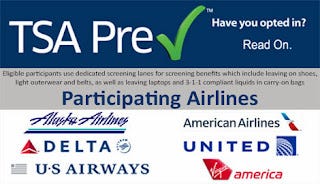TSA's pre-flight background checks brazenly ignore our civil rights

Planning on flying anywhere for the holidays? If you owe back taxes, are a frequent flyer, or own a blog that is critical of the government, you might want to rethink your plans. Under the radar in October, the Transportation Security Agency (TSA) tightened their screening guide lines to include these in their “screenings”. In fact they want a full background check.
The TSA is stepping up its screenings to include even more information into your personal life before you can even board a plane. Before they will even “allow” you to travel to your next destination, they are going even further into the warrant-less search process and violating the Bill of Rights. While the majority of public in the United States will accept this as “routine” to “prevent terrorism”, the new checks may be anything but.
The agency is saying that the new goal is to “streamline” the process and changing the procedures to “protect” millions of Americans that do not pose a risk to travel. The new measures give the government greater power to use travelers’ personal data for part of their “domestic airport screenings”. They are applying the same measures that are supposed to be used for Immigration and Customization for people entering the United States.
The procedure has been in place but was not activated until recently. The TSA released the screening regulations in order to comply with government requirements. The new regulations put some of the data collection of the National Security Administration (NSA) scrutiny to shame. As usual the details of the new provisions were never announced to the public.
So what are the things they are looking in to? Here is a quick list from TSA:
private employment information to include who you work for
vehicle registrations
travel history
property ownership records and what property you claim
physical characteristics
tax identification numbers and tax history
past travel itineraries
law enforcement information
“intelligence” information (the key word list used by the NSA)
passport numbers
frequent flier information
other “identifiers” linked to DHS databases (including web history and information, critical speaking of the government)
I think the best way to look at it is as a pre-crime assessment every time you fly,” said Edward Hasbrouck, a consultant to the Identity Project, one of the groups that oppose the prescreening initiatives. “The default will be the highest, most intrusive level of search, and anything less will be conditioned on providing some additional information in some fashion.”
The TSA which has been criticized for a one-size-fits-all approach to screening travelers, said the initiatives were needed to make the procedures more targeted.
“Secure Flight has successfully used information provided to airlines to identify and prevent known or suspected terrorists or other individuals on no-fly lists from gaining access to airplanes or secure areas of airports,” the security agency said in a statement. “Additional risk assessments are used for those higher-risk passengers.”
An agency official discussed some aspects of the initiative on the condition that she not be identified. She emphasized that the main goal of the program was to identify low-risk travelers for lighter screening at airport security checkpoints, adapting methods similar to those used to flag suspicious people entering the United States
At the heart of the expanded effort is a database called the Automated Targeting System, which is maintained by DHS and screens travelers entering the United States.
Data in the Automated Targeting System is used to decide who is placed on the no-fly list — thousands of people the United States government has banned from flying — and the selectee list, an unknown number of travelers who are required to undergo more in-depth screening, like Mr. Darrat.
The TSA also maintains a PreCheck disqualification list, tracking people accused of violating security regulations, including disputes with checkpoint or airline staff members.
Much of this personal data is widely shared within DHS and with other government agencies. Privacy notices for these databases note that the information may be shared with federal, state and local authorities; foreign governments; law enforcement and intelligence agencies — and in some cases, private companies for purposes unrelated to security or travel.
For instance, an update about the TSA’s Transportation Security Enforcement Record System, which contains information about travelers accused of “violations or potential violations” of security regulations, warns that the records may be shared with “a debt collection agency for the purpose of debt collection.”
A recent privacy notice about PreCheck notes that fingerprints submitted by people who apply for the program will be used by the F.B.I. to check its unsolved crimes database.


